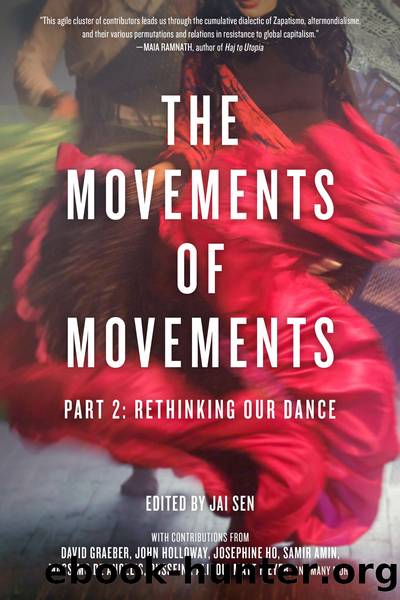The Movements of Movements by Jai Sen

Author:Jai Sen
Language: eng
Format: epub
Publisher: Independent Publishers Group
Published: 2018-07-15T00:00:00+00:00
Being Incivil
By citing these examples—each of which has to be seen in relation to the respective contexts and times in which they occurred—I am not trying to suggest a simple formula or vocabulary of being incivil but to indicate ground for us to dwell on and think about, perhaps even to consider occupying and inhabiting as our own.
I also do not mean to suggest that this ‘overturning of the world’ can only be done by the structurally incivil. Let me give one more example. One of the best known—and arguably, greatest—exponents of this militant art has, of course, been Gandhi. (Just for clarity, Gandhi was—aside from being male—a Hindu, by far the dominant religion in India (and not just Hindu but an ardent Hindu) of the Kshatriya caste by ancestry, an upper-middle caste. He was, therefore, from well within so-called ‘civil society’ in India, and he always insisted on respecting those norms.
As is well known, among Gandhiji’s most powerful contributions were the concepts and practice of non-violence (or, in the original, ahimsa, which is a little different from the immediate and apparent meaning of ‘non-violence’) and of civil disobedience. Consider the practice of civil disobedience, which is now widely accepted as one of the most fundamental of all tactics and strategies in the repertoire of movement. This was not literally Gandhiji’s own idea,31 but even if his own life and practice were full of profound contradictions,32 he explored and honed this tactic as political practice to extraordinary depths, including coining wholly new terms to express what he meant, such as satyagraha (‘being tied to the truth’ or ‘the struggle for truth’—within oneself as much as in the outside world). Through his practice—both in ‘action’ and in the way he lived his life (a lifestyle he insisted that others in the communes he built adopt as well)—he developed and forged these concepts into powerful instruments of emancipation of self, community, and society—but also, brilliantly, of the other, his opponent. In turn, his tactics have subsequently been very widely adopted, adapted, and further developed as instruments of action and thought, including by Martin Luther King in the context of the Civil Rights Movement in the US in the 1950s and ’60s. They have also been subsequently codified and widely adopted by many movements as part of their own vocabularies of social and political action.33
The discourse and praxis of ‘civil disobedience’ is in a sense especially interesting and important for our discussion here, for two reasons: one, insofar as the discourse and the practice specifically posits the imperative to always be civil during acts of civil disobedience no matter what the provocation or assault or how grave; and two, the accompanying, intertwined, and dialectically related imperative of always being disobedient when faced by a moral choice—in particular, to be disobedient towards one’s opponent, and by implication, when one’s opponent is the state, towards civil society, which is the state’s earthwork. In Gandhi’s case, the power against which he used this instrument most famously was the British Empire, which considered itself to be the fount of civility.
Download
This site does not store any files on its server. We only index and link to content provided by other sites. Please contact the content providers to delete copyright contents if any and email us, we'll remove relevant links or contents immediately.
| Anthropology | Archaeology |
| Philosophy | Politics & Government |
| Social Sciences | Sociology |
| Women's Studies |
120 Days of Sodom by Marquis de Sade(3257)
The Outpost: An Untold Story of American Valor by Jake Tapper(2552)
The Room Where It Happened by John Bolton;(2150)
Putin's Labyrinth(2015)
Operation Paperclip by Annie Jacobsen(1995)
Savage Harvest by Carl Hoffman(1952)
Thank You for Being Late by Thomas L. Friedman(1763)
A Very Stable Genius by Philip Rucker & Carol Leonnig(1665)
The Pirates of Somalia by Jay Bahadur(1621)
The Flight of the Intellectuals by Berman Paul(1501)
Gideon's Spies by Gordon Thomas(1500)
Extraordinary, Ordinary People by Condoleezza Rice(1494)
Tell by Major Margaret Witt(1437)
Art of Betrayal by Gordon Corera(1428)
Master the Civil Service Exams by Peterson's(1415)
A Warning by Anonymous(1414)
A Long Way Gone: Memoirs of a Boy Soldier by Ishmael Beah(1380)
Pirates of Somalia by Jay Bahadur(1376)
Love Wins by Debbie Cenziper(1357)
